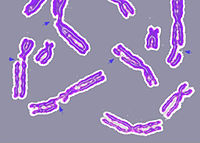
Photo from wikipedia
Radiation-induced lung injury (RILI) is a common and serious complication in the radiation therapy of thoracic cancer, which significantly restricts the radiation doses of tumor. The prevention and treatment of… Click to show full abstract
Radiation-induced lung injury (RILI) is a common and serious complication in the radiation therapy of thoracic cancer, which significantly restricts the radiation doses of tumor. The prevention and treatment of RILI have long been clinical challenges. SIRT1 is an NAD+ dependent protein deacetylase and the exact role of SIRT1 in RILI remains unclear. The aim of this study is to investigate the prevention and repairing efficacy of RILI by adenovirus-mediated SIRT1 gene overexpression in a mice model. Our studies confirmed that the protein expression and activity of SIRT1 in lung tissues were decreased in RILI mice models in a time-dependent manner, but the mRNA expression level was not obviously changed. The activity of SIRT1 was elevated by orally given resveratrol, an agonist of SIRT1. The extent of RILI could be evidently alleviated by orally given resveratrol, as assayed by histopathology, malondialdehyde (MDA) and plasma cytokines (IL-1β, TNF-α and active TGF-β1). Overexpressing SIRT1 could obviously mitigate the extent of RILI (HE as well as improve the mice survival. Moreover, SIRT1 could inhibit the radiation-induced DNA damage in vivo and in vitro, and decreased the expression of acetylated- Ku70 in the lung. In vitro Co-IP experiment showed that the expression of SIRT1 in irradiated cells was reduced and the acetylated- Ku70 was increased; over-expressing SIRT1 promoted the de-acetylation of Ku70; interference of Ku70 could reverse the effect of SIRT1 in DNA repair. Furthermore, overexpressing SIRT1 could inhibit the acetylation level of NF-κB subunit RELA (P65) in the lung; in vitro report gene experiment showed that SIRT1 suppressed the NF-κB transcriptional activity. In conclusion, our results suggest that SIRT1 could evidently mitigate the RILI, repair the irradiation-induced DNA damage and inflammation via de-acetylating the Ku70 and P65. Our study may provide new avenue for the prevention and treatment of RILI in clinic. Note: This abstract was not presented at the meeting. Citation Format: Jianxin Xue, Lin Zhou, Feifei Na, Lei Deng, Jie Lan, Bo Lu, Adam Dicker, You Lu. SIRT1 protects against radiation-induced lung injury via de-acetylating the Ku70 and P65 [abstract]. In: Proceedings of the American Association for Cancer Research Annual Meeting 2017; 2017 Apr 1-5; Washington, DC. Philadelphia (PA): AACR; Cancer Res 2017;77(13 Suppl):Abstract nr 5847. doi:10.1158/1538-7445.AM2017-5847
Journal Title: Cancer Research
Year Published: 2017
Link to full text (if available)
Share on Social Media: Sign Up to like & get
recommendations!